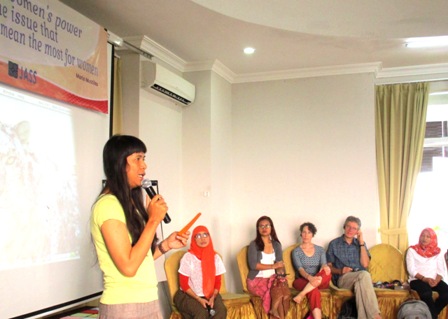Safe space is a critical component of JASS’ movement building processes. We deliberately define safe spaces as political spaces for building common ground among diverse activists. When activists come together, they come with histories of trauma, stigma, and isolation. To build solidarity and collectively strategize about the risks and violence they face, they need safe spaces to break silences, feel connected, analyze power dynamics, and find common ground. Safe space is the foundation for political awareness, new organizing strategies, and the resilience that comes with strong solidarity and support.
Forum Aktivis Perempuan Muda-Indonesia (FAMM-Indonesia), also known as the Young Indonesian Women Activists’ Forum, provides safe spaces to its 350 members who are LBTI, Muslim, rural and indigenous women. FAMM strategies draw on JASS’ power framework and feminist popular education facilitation methods to challenge social norms about sex, sexuality, and discrimination, while finding effective ways to influence decision makers. FAMM has turned the creation of safe spaces and mutual acceptance, trust, and “home” into a political strategy for collective power and safety. Centered on solidarity, FAMM members support each other through difficulties and crises.
To understand the importance of safe spaces from the perspective of the different contexts we work in, we interviewed Ajeng Herliyanti, FAMM’s national coordinator.
How would you describe a safe space?
A safe space is not [just] a physical space. Sometimes, members just want to talk to someone. That is what we provide, a listening ear. Sometimes, we maintain safe spaces through virtual communication. Safe spaces also provide a venue for women to pause, reflect, and recharge.
Why are safe spaces important?
Safe spaces enable young women activists to reflect on their work. In a safe space, all the physical, emotional, and spiritual baggage is unloaded. We deal with the burn out that members experience. A safe space can be a room for young women to get rest, to flesh out their feelings, and to reflect on their own thoughts and fears. This is a room where members of FAMM need to pass before they get ready to work again.
What value do safe spaces bring to women’s lives?
Safe spaces bring nurture, nature, love, kindness, acceptance, inclusivity, diversity, and letting go of all excess baggage. Trust, understanding, acceptance, and the relation between one another which is essential for them to understand their work better and put it in alignment with their feminist realities.
How do FAMM members integrate safe spaces into their work and activism?
To continue to connect the individual activist to the larger movement, safe spaces are initiated by FAMM as a platform for their members to reflect on and make their work more relevant especially with the current changing contexts in Indonesia. In our experience each FAMM member is facing a different problem; each is facing a different attack. That is why there is no magic bullet or single solution to what our responses should be for women activists. Many FAMM members have more responsibilities and face more challenges in their work and activism. So we really need to create different ways to accompany them.
What advice do you have for women activists around the world?
We need more voices of women, especially young women, from the grassroots to be heard. I encourage all women to live bravely, to advocate for themselves, to connect with themselves, to express their realness, and to assert and fight for what they want.


























